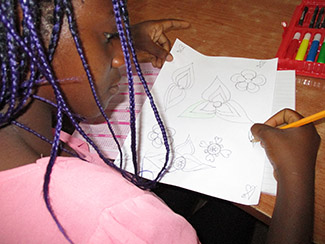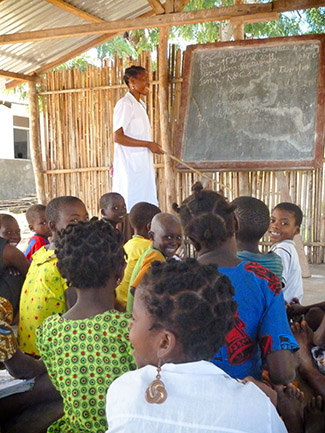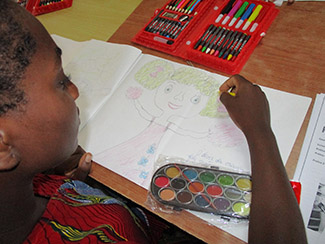consent_cookie
Duración: 1 year
Stores the user's cookie consent state
04-10-2017
On October 5, World Teachers' Day is celebrated. "Teaching in freedom, empowering teachers" is the motto of this day, organized since 1994 under the umbrella of UNESCO. Convinced that education is a key part of the progress of people and communities, we join this day with the vision of the work carried out both by the Foundation and by the other organizations that are part of Human People to People.
This work in the field of education improvement focuses on several areas: vocational training for young people, education for vulnerable minors, adult literacy classes, and especially the Teachers Training College (TTC), whose 53 Centers in Africa and India have allowed to graduate to 35,000 primary school teachers since 1993. One of them is (or will be soon) Onisia Engracia Antonio, whose testimony collected by our ADPP-Angola partners reflects perfectly the work of the TTC.
These schools focus on the training of those who will be future primary teachers, promoting their critical thinking and their ability to adapt to the often complex conditions of most of their communities, located in rural areas, with limited resources and with a ratio by classroom of 50 students per teacher.
'I like to be a teacher, I love teaching and seeing how the girls and boys learn'
Onisia Engracia is training in the EPF of Caxito (Angola), a center under the auspices of our local partner ADPP. "I am in my third year," he explains, "I like to be a teacher, I love teaching and seeing how girls and children learn." "Last year I worked in the girls' empowerment program. With my group of internships, we have done many activities at our school, such as the launch of clubs or sports or reading groups, "he continues.
Humana People to People is convinced of the importance of quality education. His approach lies in the idea that professors are one of the fundamental factors in the learning experience of the young, they are models to follow in their communities and play an important role in the promotion of more inclusive and fair cultural norms.
Teachers Training Colleges
The Federation promotes Teachers Training Colleges in Angola, Guinea-Bissau, Malawi, Mozambique, Democratic Republic of the Congo, Zambia and India. Internationally accredited, its program includes extensive practical training so that future teachers apply everything learned in the field and thus accumulate experience for which their professional work will be short-term. In fact, they are more than professors: they are energizers with a great capacity to mobilize the community in order to improve their living conditions.
Much of the teaching staff that graduates are women. For Onisia Engracia, the most rewarding thing is the work that she does with girls: "It is very important that they be valued. We launched a drawing group and invited some girls to participate. At first they were not very interested, but we convinced them and when they began to draw, they liked it. I was surprised to draw so well. After finishing, we place their jobs on the wall and invite other students from the school to see them. " "It was a pretty experience," he confesses, "everyone has different qualities and we can teach each other."
Sustainable Development Goal 4
The Sustainable Development Goal (ODS) number 4 is dedicated to education and its main objective is "to guarantee and promote lifelong learning opportunities for all". From the United Nations they remember that the goal of achieving inclusive and quality education for all is based on the firm conviction that education is one of the most powerful and proven engines to ensure sustainable development. "To this end, the objective seeks to ensure that all girls and boys complete their primary and secondary education free for 2030. It also aims to provide equal access to affordable technical training and eliminate gender disparities and income, in addition to achieving universal access to higher quality education, "they add.
More than 35,000 trained teachers
On World Teachers Day, Humana People to People remembers the impact that the work of the organizations that make up the Federation has in the training of teachers in Africa and India. In almost 25 years of work, they have trained 35,000 primary school teachers who have subsequently practiced in communities with high rates of illiteracy. In addition, last year some 700,000 children received classes of students in practices of said schools. Only in 2016, the number of future elementary teachers who received training was 12,500.


